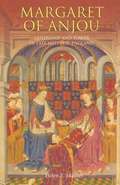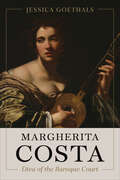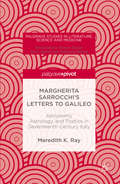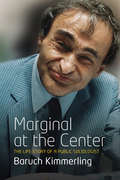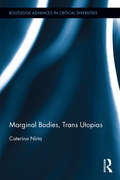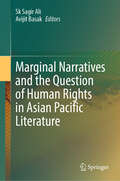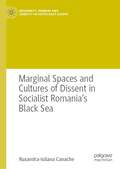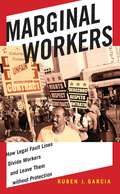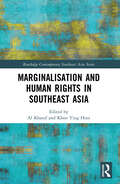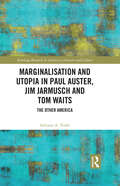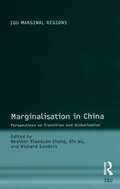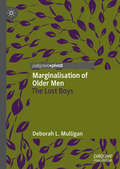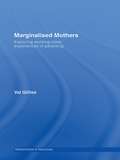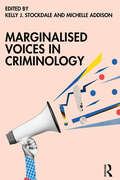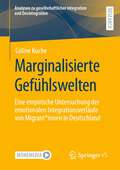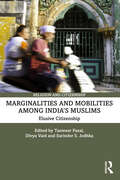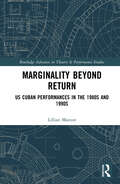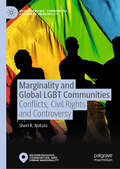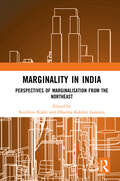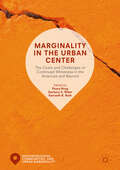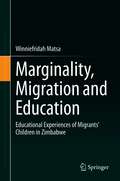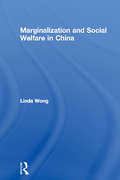- Table View
- List View
Margaret Of Anjou: Queenship and Power in Late Medieval England
by Helen E. MaurerMargaret of Anjou was a vengeful and violent woman, or so we have been told, whose vindictive spirit fuelled the fifteenth-century dynastic conflict, the Wars of the Roses. In Shakespeare's rendering she becomes an adulterous queen who mocks her captive enemy, Richard, duke of York, before killing him in cold blood. Shakespeare's portrayal has proved to be remarkably resilient, because Margaret's queenship lends itself to such an assessment. In 1445, at the age of fifteen, she was married to the ineffectual Henry VI, a move expected to ensure peace with France and an heir to the throne. Eight years later, while she was in the later stages of her only pregnancy, Henry suffered a complete mental collapse that left him catatonic for roughly a year and a half: Margaret came to the political forefront. In the aftermath of the king's illness, she became an indefatigable leader of the Lancastrian loyalists in their struggle against their Yorkist opponents. Margaret's exercise of power was always fraught with difficulty: as a woman, her effective power was dependent upon her invocation of the authority of her husband or her son. Her enemies lost no opportunity to charge her with misconduct of all kinds. More than five hundred years after Margaret's death this examination of her life and career allows a more balanced and detached view.
Margaret Paston’s Piety
by Joel T. RosenthalThe collection of Margaret Paston's letters and papers from fifteenth century England offeran invaluableexampleof daily life during that period. Drawing on a close reading of these personal letters, as well as Paston'swill, this book reveals how popular religion was integrated into daily life. "
Margherita Costa, Diva of the Baroque Court (Toronto Italian Studies)
by Jessica GoethalsThe Roman singer, courtesan, and writer Margherita Costa won prominence and fame across the courts of Italy and France during the mid-seventeenth century. She secured a steady stream of elite patrons – including popes, queens, grand dukes, and influential cardinals – while male poets and librettists wrote celebratory poetry on her behalf. In addition to her appearances as a soprano on the opera stage, Costa published a remarkable fourteen full-length texts across an expanse of genres: burlesque comedy, drama, equestrian ballet, pastoral opera, amorous letters, lyric poetry, and history. Margherita Costa, Diva of the Baroque Court brings together close textual readings of Costa’s numerous publications with archival materials detailing her performance itinerary and social-cultural networks. The book progresses chronologically through her life, geographically along the routes she travelled, and thematically via the genres in which she experimented. Jessica Goethals illuminates how Costa was unafraid to leap over the boundaries of decorum that delimited what women should and did write about. More than merely a literary biography, this book is also a portrait of seventeenth-century courts, their concerns, and their entertainments.
Margherita Sarrocchi's Letters to Galileo: Astronomy, Astrology, and Poetics in Seventeenth-Century Italy (Palgrave Studies in Literature, Science and Medicine)
by Meredith K. RayThis book examines a pivotal moment in the history of science and women’s place in it. Meredith Ray offers the first in-depth study and complete English translation of the fascinating correspondence between Margherita Sarrocchi (1560-1617), a natural philosopher and author of the epic poem, Scanderbeide (1623), and famed astronomer, Galileo Galilei. Their correspondence, undertaken soon after the publication of Galileo’s Sidereus Nuncius, reveals how Sarrocchi approached Galileo for his help revising her epic poem, offering, in return, her endorsement of his recent telescopic discoveries. Situated against the vibrant and often contentious backdrop of early modern intellectual and academic culture, their letters illustrate, in miniature, that the Scientific Revolution was, in fact, the product of a long evolution with roots in the deep connections between literary and scientific exchanges.
Marginal At The Center: The Life Story of a Public Sociologist
by Baruch KimmerlingA self-proclaimed guerrilla fighter for ideas, Baruch Kimmerling was an outspoken critic, a prolific writer, and a "public" sociologist. While he lived at the center of the Israeli society in which he was involved as both a scientist and a concerned citizen, he nevertheless felt marginal because of his unconventional worldview, his empathy for the oppressed, and his exceptional sense of universal justice, which were at odds with prevailing views. In this autobiography, the author, who was born in Transylvania in 1939 with cerebral palsy, describes how he and his family escaped the Nazis and the circumstances that brought them to Israel, the development of his understanding of Israeli and Palestinian histories, of the narratives each society tells itself, and of the implacable "situation"--along with predictions of some of the most disturbing developments that are taking place right now as well as solutions he hoped were still possible. Kimmerling's deep concern for Israel's well-being, peace, and success also reveals that he was in effect a devoted Zionist, contrary to the claims of his detractors. He dreamed of a genuinely democratic Israel, a country able to embrace all of its citizens without discrimination and to adopt peace as its most important objective. It is to this dream that this posthumous translation from Hebrew has been dedicated.
Marginal Bodies, Trans Utopias (Routledge Advances in Critical Diversities)
by Caterina NirtaAlthough over the last two decades there has been a proliferation of gender studies, transgender has largely remained institutionalised as an ‘umbrella term’ that encapsulates all forms of gender understandings differing from what are thought to be gender norms. In both theoretical and medical literature, trans identity has been framed within a paradigm of awkwardness or discomfort, self-dislike or dysfunctional mental health. Marginal Bodies, Trans Utopias is a multidisciplinary book that draws primarily from Deleuze and post-structuralism in order to reformulate the concept of utopia and ground it in the materiality of the present. Through a radically new conceptualisation of the time and space of utopia, it analyses empirical findings from trans video diaries on the Internet belonging to transgender individuals. In doing so, this volume offers new insights into the everyday challenges faced by these subjectivities, with case studies focusing on: the legal/social impact of the UK’s Gender Recognition Act 2004, boundaries of public and private as evidenced within public toilets, and the narrative of the ‘wrong body’. Contextualising and applying Deleuzian concepts such as ‘difference’ and ‘marginal’ to the context of the research, Nirta helps the reader to understand trans as ‘unity’ rather than as a ‘mind-body mismatch’. Contributing to the reading and understanding of trans lived experience, this book shall be of interest to postgraduates and postdoctoral researchers interested in fields such as Transgender Studies, Critical Studies, Sociology of Gender and Philosophy of Time.
Marginal Narratives and the Question of Human Rights in Asian Pacific Literature
by Sk Sagir Ali Avijit BasakThis book represents a significant intervention in human rights and its literary praxis, underscoring its paramount relevance and pressing urgency within the intricate tapestry of the Asian Pacific context. The book examines the local trauma endured within the complex geopolitical landscape of the Asian continent while also embracing a broader outlook that transcends geosocial boundaries. As a pivotal contribution to the discourse on Asian trauma studies, the chapters address a critical scholarly lacuna by delving into critical theoretical reflections and providing a robust epistemological foundation. The chapters look at human rights and trauma studies in a way that focuses not only on Europe. The volume fosters a deep comprehension of the historical and cultural facets shaping the Asian continent and its human rights challenges. The book is indispensable for educators, policymakers, and researchers engaged in the intricate realm of human rights and trauma studies.
Marginal Spaces and Cultures of Dissent in Socialist Romania's Black Sea (Modernity, Memory and Identity in South-East Europe)
by Ruxandra-Iuliana CanacheThis book analyzes two Romanian villages – 2 Mai and Vama Veche – as spaces of relative freedom during the last decades of socialist rule. This microhistorical study refutes simplistic views of the communist past which focus on political figures and events, and instead explores ordinary people and everyday life. Taking a multidisciplinary approach, it considers a broad range of sources, including official Communist Party documents, secret police files, personal memoirs, oral history interviews, ethnographic films, songs, and artistic performances. This book intertwines three narrative threads: that of the visitors (mainly members of the Romanian intelligentsia, young people, and hippies); that of the local inhabitants; and that of 'authority' (local and central state agents actively engaged in surveillance and supervision). In doing so, it interrogates the spectrum of consent/dissent and resistance/collaboration hitherto neglected in scholarship.
Marginal Subjects
by Akiko TsuchiyaLate nineteenth-century Spanish fiction is populated by adulteresses, prostitutes, seduced women, and emasculated men - indicating an almost obsessive interest in gender deviance. In Marginal Subjects, Akiko Tsuchiya shows how the figure of the deviant woman--and her counterpart, the feminized man - revealed the ambivalence of literary writers towards new methods of social control in Restoration Spain.Focusing on works by major realist authors such as Benito Pérez Galdós, Emilia Pardo Bazán, and Leopoldo Alas (Clarín), as well as popular novelists like Eduardo López Bago, Marginal Subjects argues that these archetypes were used to channel collective anxieties about sexuality, class, race, and nation. Tsuchiya also draws on medical and anthropological texts and illustrated periodicals to locate literary works within larger cultural debates. Marginal Subjects is a riveting exploration of why realist and naturalist narratives were so invested in representing gender deviance in fin-de-siècle Spain.
Marginal Workers: How Legal Fault Lines Divide Workers and Leave Them without Protection (Citizenship and Migration in the Americas #5)
by Ruben J. GarciaUndocumented and authorized immigrant laborers, female workers, workers of color, guest workers, and unionized workers together compose an enormous and diverse part of the labor force in America. Labor and employment laws are supposed to protect employees from various workplace threats, such as poor wages, bad working conditions, and unfair dismissal. Yet as members of individual groups with minority status, the rights of many of these individuals are often dictated by other types of law, such as constitutional and immigration laws. Worse still, the groups who fall into these cracks in the legal system often do not have the political power necessary to change the laws for better protection.In Marginal Workers, Ruben J. Garcia demonstrates that when it comes to these marginal workers, the sum of the law is less than its parts, and, despite what appears to be a plethora of applicable statutes, marginal workers are frequently lacking in protection. To ameliorate the status of marginal workers, he argues for a new paradigm in worker protection, one based on human freedom and rights.
Marginalisation and Human Rights in Southeast Asia (Routledge Contemporary Southeast Asia Series)
by Al Khanif Khoo Ying HooiThis book analyses marginalisation and human rights in Southeast Asia and offers diverse approaches in understanding the nuances of marginalisation and human rights in the region. Throughout the region, a whole range of similarities and differences can be observed relating to the Southeast Asian experience of human rights violation, with each country maintaining particular aspects reflecting the variability of the use and abuse of political power. This book explores the distinct links between marginalisation and human rights for groups exposed to discrimination. It focuses on ethnic minorities, children, indigenous peoples, migrant workers, refugees, academics, and people with disabilities. This book highlights the disparities in attainment and opportunity of marginalised and minority groups in Southeast Asia to their rights. It examines how marginalisation is experienced, with case studies ranging from a regional approach to country context. Paying attention to how broader socio-economic and political structures affect different people’s access to, or denial of, their fundamental human rights and freedoms, the book argues that tackling human rights abuses remains a major hurdle for the countries in Southeast Asia. Providing a broader conceptual framework on marginalisation and human rights in Southeast Asia and a new assessment of these issues, this book will be of interest to readers in the fields of Asian Law, Human Rights in Asia, and Southeast Asian Studies, in particular Southeast Asian Politics.
Marginalisation and Utopia in Paul Auster, Jim Jarmusch and Tom Waits: The Other America (Routledge Research in American Literature and Culture)
by Adriano A. TeddeThis book explores how three contemporary American artists through the mediums of film, literature and popular music have contributed to the tradition of American progressivism, and provides an invaluable companion to the understanding of complex issues such as inequality and social and economic decline that are apparent in America today. Connecting the works of these artists through a fictional country – the ‘Other America’ – the book shows how they have refuted middle-class values and goals of success, money and social affirmation to unveil the less celebrated, dark side of contemporary America, which, despite the troubles currently faced, never loses hope for a better future. This utopic vision in the face of adversity is explored through the plots, characters and mis-en-scène of Auster and Jarmusch’s work and Waits’s lyrics and sound. This vision challenges the dominant narratives of America as the land of opportunity and values democracy, civic engagement, communitarianism and egalitarianism. Offering an important new perspective to literature on contemporary American culture, this book will be of interest to students and scholars of American studies, film studies, popular music, postmodern literature, cultural studies and sociology.
Marginalisation in China: Perspectives on Transition and Globalisation
by Bin Wu Richard SandersEconomic transition in China has witnessed (re)centralization of resources from the margin to the core in economic, social and political senses. This book employs a marginalization lens to reveal, delineate and better understand the processes, patterns, trends, multiple dimensions and dynamics of the phenomenon, and the consequences and implications for development and well-being in the country. Bringing together a wide range of domestic and international experts and disciplinary perspectives, the book combines empirical research and conceptual analysis to provide an insightful overview of China's recent development. It contributes to the debate over marginalization and its interactions with globalization and transition in China, and has significance for various domestic and international policy arenas in respect of tackling marginalization, poverty and social exclusion effectively while striving for the achievement of the UN Millennium Development Goals in China and beyond.
Marginalisation of Older Men: The Lost Boys
by Deborah L. MulliganMarginalisation of Older Men: The Lost Boys focuses on the phenomenon of the marginalisation of older men and the impact of gendered ageing as a pathologic disorder leading to suicide ideation, rather than a celebratory state. In this engaging investigation,Deborah Mulligan explains why and how some older men have become marginalised in society, and the effects of this social isolation. The book offers effective and unique methods for researching marginalised groups and individuals to maximise innovativeness, reciprocity and utility for research participants. Mulligan skilfully articulates and communicates the hitherto unheard voices of older males. These voices represent a vital element in the mitigation of loneliness, social isolation and suicide. The lived experience of these individual men and their peers provides vital health information for older men in both contemporary and future society.
Marginalised Mothers: Exploring Working Class Experiences of Parenting (Relationships and Resources)
by Val GilliesSuccessive moral panics have cast poor or socially excluded mothers - associated with social problems as diverse as crime, underachievement, unemployment and mental illness - as bad mothers. Their mothering practices are held up as the antithesis of good parenting and are associated with poor outcomes for children. Marginalised Mothers provides a detailed and much-needed insight into the lived experience of mothers who are frequently the focus of public concern and intervention, yet all too often have their voices and experiences overlooked. The book explores how they make sense of their lives with their children and families, position themselves within a context of inequality and vulnerability, and resist, subvert and survive material and social marginalisation. This controversial text uses qualitative data from a selection of working class mothers to highlight the opportunities and choices they face and to expose the middle class assumptions that ground much contemporary family policy. It will be of interest to students and researchers in sociology, social work and social policy, as well as social workers and policymakers.
Marginalised Voices in Criminology
by Michelle Addison Kelly J. StockdaleThis book is about people who are marginalised in criminology; it is an attempt to make space and amplify voices that are too often overlooked, spoken about, or for. In recognising the deep-seated structural inequalities that exist within criminal justice, higher education, and the field of criminology, we offer this text as a critical pause to the reader and invite you to reflect and consider within your studies and learning experience, your teaching, and your research: whose voices dominate, and whose are marginalised or excluded within criminology and why?This edited collection offers chapters from international criminology scholars, activists, and practitioners to bring together a range of perspectives that have been marginalised or excluded from criminological discourse. It considers both obscured and marginalised criminological theorists and schools of thought, presents alternative viewpoints on ‘traditional’ criminal justice themes, and considers how marginalisation is perpetuated through criminological research and criminological teaching. Engaging with debates on power, colonialism, identity, hegemony and privilege, and bringing together perspectives on gender, race and ethnicity, indigenous knowledge (s), queer and LGBTQ+ issues, disabilities, and class, this concise collection brings together key thinkers and ideas around concerns about epistemological supremacy.Marginalised Voices in Criminology is crucial reading for courses on criminological theory and concerns, diversity, gender, race, and identity.
Marginalisierte Gefühlswelten: Eine empirische Untersuchung der emotionalen Integrationsverläufe von Migrant*innen in Deutschland (Analysen zu gesellschaftlicher Integration und Desintegration)
by Coline KucheSubjektive Faktoren wie Emotionen von Personen mit Migrationshintergrund sind bisher ein Randthema in der sozialwissenschaftlichen Forschung. Daher untersucht die Studie migrantische Emotionserfahrungen im Zuge von Integrationsprozessen. Drei Forschungsfragen leiten die Untersuchung: "Gibt es emotionale Unterschiede zwischen Migrant*innen aus unterschiedlichen Herkunftsländern und der Aufnahmebevölkerung?", "Wie entwickeln sich emotionale Befindlichkeiten von Migrant*innen im Zeitverlauf?", "Welchen Einfluss üben sonstige Integrationsprozesse auf die emotionale Integration aus?". Für die Beantwortung der Fragen wird u.a. auf innovative Ansätze aus der Emotionssoziologie und Kulturpsychologie zurückgegriffen. Die abgeleiteten Hypothesen werden anhand der Daten des Sozio-oekonomischen Panels (SOEP), einer repräsentativen Bevölkerungsstichprobe Deutschlands überprüft. Die Studie legt offen, dass emotionale Unterschiede zwischen Personen mit und ohne Migrationshintergrund sowie in Abhängigkeit der kulturellen Distanz bestehen, welche sich durch das häufigere Auftreten von negativen Emotionserfahrungen für Migrant*innen äußern. Diese Unterschiede nehmen im Zeitverlauf eher zu oder stagnieren. Dabei stehen diese hauptsächlich in Zusammenhang mit wahrgenommenen Benachteiligungserfahrungen und einem Mangel an transnationalen Kontakten.
Marginalisierung, Stadt und Soziale Arbeit: Soziale Arbeit im Spannungsfeld von Politik, Quartierbevölkerung und professionellem Selbstverständnis (Quartiersforschung)
by Carlo Fabian Patrick Oehler Sandra Janett Jutta Guhl Bruno MichonDieser Open-Access-Sammelband zeigt auf, welche Themen mit Blick auf das Handlungsfeld Soziale Arbeit und Stadtentwicklung besonders relevant sind und zurzeit im Vordergrund stehen. Marginalisierte Menschen und Quartiere sind typische Phänomene sozialer Ungleichheit in modernen Städten, auf die sich Soziale Arbeit – von Beginn an – forschend und professionell handelnd bezieht. Themen, die in den Beiträgen verhandelt werden, sind unter anderem marginalisierte Quartiere, Segregation, Nachbarschaften, Community Organizing/Gemeinwesenarbeit, Partizipation, Integration, Sozialplanung, lokale Demokratie und soziale Innovation.
Marginalities and Mobilities among India’s Muslims: Elusive Citizenship (Religion and Citizenship)
by Surinder S. Jodhka Tanweer Fazal Divya VaidThis book studies how marginality impacts the everyday lives of Indian Muslims. It challenges the prevailing myths and stereotypes through which Indian Muslims have come to be seen in the popular imagination. The volume engages with questions of citizenship, collective violence, and issues of civil and criminal jurisprudence. It explores the linkages between development, marginality, and citizenship – the three critical issues for modern democracies today. Going beyond the singular narrative of a community on a continuous slide, the chapters in this volume present diversities of the Muslim experience of exclusion and participation. It discusses themes such as violence and marginality among minorities; Indian Muslims and the ghettoized economy; employment aspirations of low-income Muslim men; intergenerational social mobility of Muslims; the nature of the middle class; and the question of Islam, development, and globalization to showcase the living conditions of Muslims in India. Part of the Religion and Citizenship series, this timely volume will be an essential read for scholars and researchers of political studies, sociology, political sociology, minority studies, public policy, religion, citizenship studies, diversity and inclusion studies, and social anthropology.
Marginality Beyond Return: US Cuban Performances in the 1980s and 1990s (Routledge Advances in Theatre & Performance Studies)
by Lillian ManzorThis study is an exploration of US Cuban theatrical performances written and staged primarily between 1980 and 2000. Lillian Manzor analyzes early plays by Magali Alabau, Jorge Ignacio Cortiñas, María Irene Fornés, Eduardo Machado, Manuel Martín Jr., and Carmelita Tropicana as well as these playwrights’ participation in three foundational Latine theater projects --INTAR’s Hispanic Playwrights-in-Residence Laboratory in New York (1980-1991), Hispanic Playwrights Project at South Coast Repertory Theater in Costa Mesa, CA (1986-2004), and The Latino Theater Initiative at Center Theater Group's Mark Taper Forum in Los Angeles (1992-2005). She also studies theatrical projects of reconciliation among Cubans on and off the island in the early 2000s. Demonstrating the foundational nature of these artists and projects, the book argues that US Cuban theater problematizes both the exile and Cuban-American paradigms. By investigating US Cuban theater, the author theorizes via performance, ways in which we can intervene in and reformulate political and representational positionings within the context of hybrid cultural identities. This book will of great interest to students and scholars in Performance Studies, Transnational Latine Studies, Race and Gender studies.
Marginality and Global LGBT Communities: Conflicts, Civil Rights and Controversy (Neighborhoods, Communities, and Urban Marginality)
by Sheri R. NotaroThis book examines the interconnectedness of LGBT civil and political rights, bias, discrimination, homophobia, and LGBT health disparities both in the United States and globally. According to Notaro, the failure to extend equitable civil and political rights to LGBT individuals—combined with recent reversal of past gains—will continue to be associated with bias, stigma and discrimination toward the LGBT community. In turn, this sustained bias and stigma fosters a host of LGBT health disparities, including access to culturally competent health care, HIV/AIDS, substance use, homelessness, suicide, and violence. Thus, the bias and discrimination levied at the LGBT community is discussed as a major explanatory factor in life-threatening health disparities experienced by the community, particularly in urban areas worldwide. The volume provides a framework for considering future research that must identify ways to prevent these health disparities, being mindful of and harnessing the protective factors and supports that exist within the diverse LGBT community.
Marginality in India: Perspectives of Marginalisation from the Northeast
by Kedilezo Kikhi and Dharma Rakshit GautamThe book takes a close look into the definitions and categorizations of marginality, inequality, agency and location in society. It examines the systems of marginalization and othering by exploring perspectives of socially excluded people and communities in Northeast India. The context of Northeast India provides unique perspectives on the debates around marginality due to the existence of multi-ethnic cultures in the region and since its prolonged colonial historical experience alienated it from the rest of India. This volume focuses on the issues pertaining to tribe, caste, gender identity, religion, and physical disability in the region. It also looks at the roles which institutions, education and the media play in the creation and perpetuation of social exclusion and the centre—periphery binary. With essays from eminent scholars and social scientists, the book discusses themes such as citizenship and borders, national and tribal identity, the role of the law, government and policies for countering exclusion and the challenges which socially excluded groups and communities face to gain agency, autonomy and the right to equality. This book will be useful for scholars and researchers of sociology, Northeast India studies, political sociology, development studies, political science, gender studies, and social anthropology.
Marginality in the Urban Center: The Costs and Challenges of Continued Whiteness in the Americas and Beyond (Neighborhoods, Communities, and Urban Marginality)
by Peary Brug Zachary S. Ritter Kenneth R. RothThis book examines the increasing marginalization of and response by people living in urban areas throughout the Western Hemisphere, and both the local and global implications of continued colonial racial hierarchies and the often-dire consequences they have for people perceived as different. However, in the aftermath of recent U.S. elections, whiteness also seems to embody strictures on religion, ethnicity, country of origin, and almost any other personal characteristic deemed suspect at the moment. For that reason, gender, race, and even class, collectively, may not be sufficient units of analysis to study the marginalizing mechanisms of the urban center. The authors interrogate the social and institutional structures that facilitate the disenfranchisement or downward trajectory of groups, and their potential or subsequent lack of access to mainstream rewards. The book also seeks to highlight examples where marginalized groups have found ways to assert their equality. No recent texts have attempted to connect the mechanisms of marginality across geographical and political boundaries within the Western Hemisphere.
Marginality, Migration and Education: Educational Experiences of Migrants’ Children in Zimbabwe
by Winniefridah MatsaThis book provides a missing link between marginality, migration and education in Zimbabwe, focusing on the educational experiences of migrants’ children in an effort to influence government policies concerning migrant parents and their left-behind children. While there is a large body of knowledge on the education of children of immigrants in destination countries, this book aims to fill in the gap by addressing the children who do not migrate with their parents. Through this unique approach, the book examines the education statuses of these left-behind children, offering insights into their educational challenges, rights, and inequities to better inform policy decisions to meet the 2030 education agenda for action established by the United Nations in 2015. The book will of interest and use to governments, NGOs, teachers and local communities in Africa as a resource to better understand the situation of migrants’ left-behind children as a category of vulnerable children in difficult circumstances.
Marginalization and Social Welfare in China
by Linda WongThis book provides a systematic analysis that defines and accounts for the contours and operation of China's welfare system. It is underpinned by recent empirical research and strong comparative theory, and will be welcomed as a significant advance in furthering our understanding of social welfare in China.
